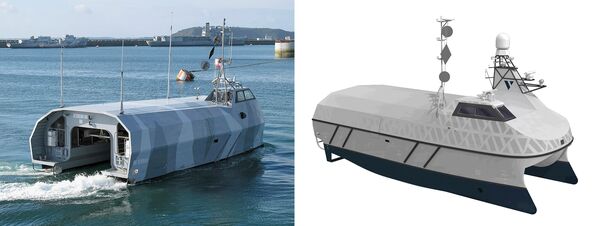
Originally built to support DGA's ESPADON MCM technology demonstration programme, Sterenn Du is now being converted to serve as a testbed for maritime autonomy. (Richard Scott/NAVYPIX (left) + Naval Group (right))
France's Naval Group is modifying and repurposing an existing optionally manned trials vessel to serve as an experimental testbed for large uncrewed platform and autonomous systems, the company has revealed.
Under a loan arrangement with France's Direction générale de l'armement (DGA), the trials craft Sterenn Du is being converted to support science and technology applicable to next-generation uncrewed surface vessels (USVs). Naval Group is self-funding the conversion, which began in Brest earlier this year.
Sterenn Du is a 17 m aluminium catamaran originally delivered in 2011 to support technology demonstrations associated with the DGA's ESPADON (Ėvaluation incrèmentale de Solutions Potentielles d'Automatìsatìon de Deminage pour les Opérations Navales) stand-off mine countermeasures (MCM) technology demonstration programme. ESPADON, which ran until May 2016, was a national effort designed to de-risk overarching concepts and crucial technologies applicable to the French Navy's projected Système de lutte anti-mines – futur (SLAM-F) future MCM capability.
Built by Pech'Alu International in Morbihan under contract to what is now Naval Group, Sterenn Du was used as a testbed platform to evaluate the operational practicality of the remote, fully automated launch and recovery of towed sonar payloads and autonomous underwater vehicles (AUVs). The craft has remained under DGA ownership since the conclusion of the ESPADON programme.
According to Aymeric Moullart de Torcy, Naval Group's senior business development manager for unmanned systems and cyber, work to convert Sterenn Du
Looking to read the full article?
Gain unlimited access to Janes news and more...







